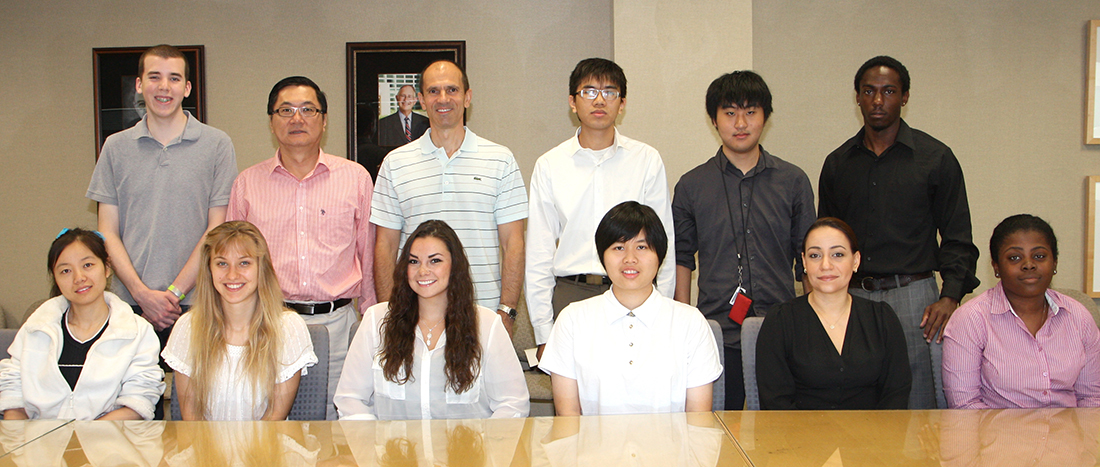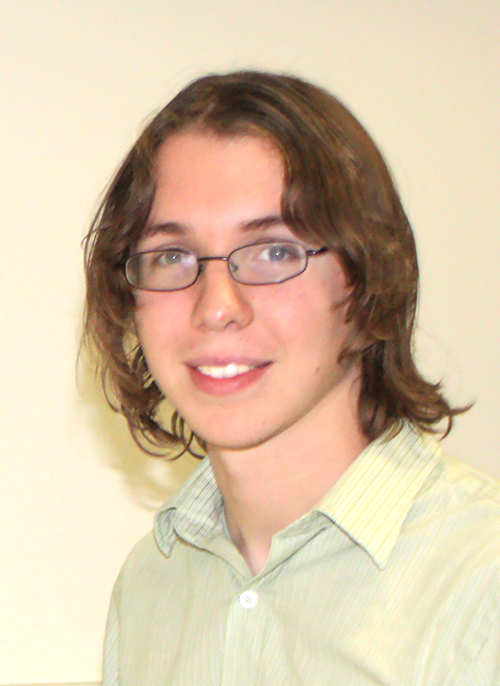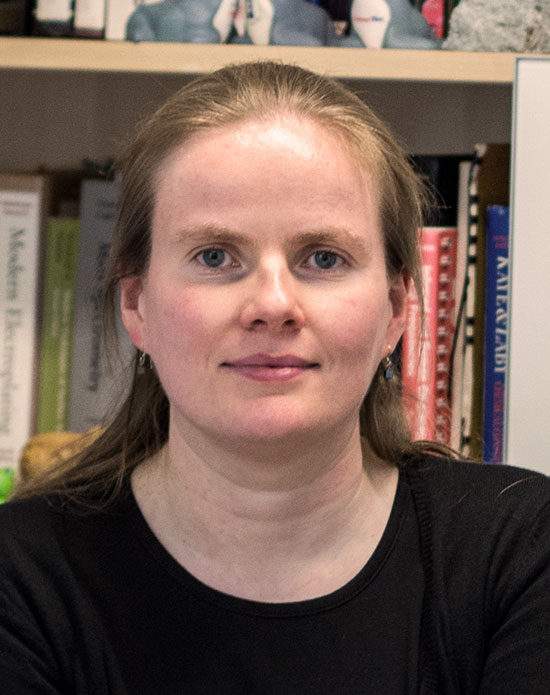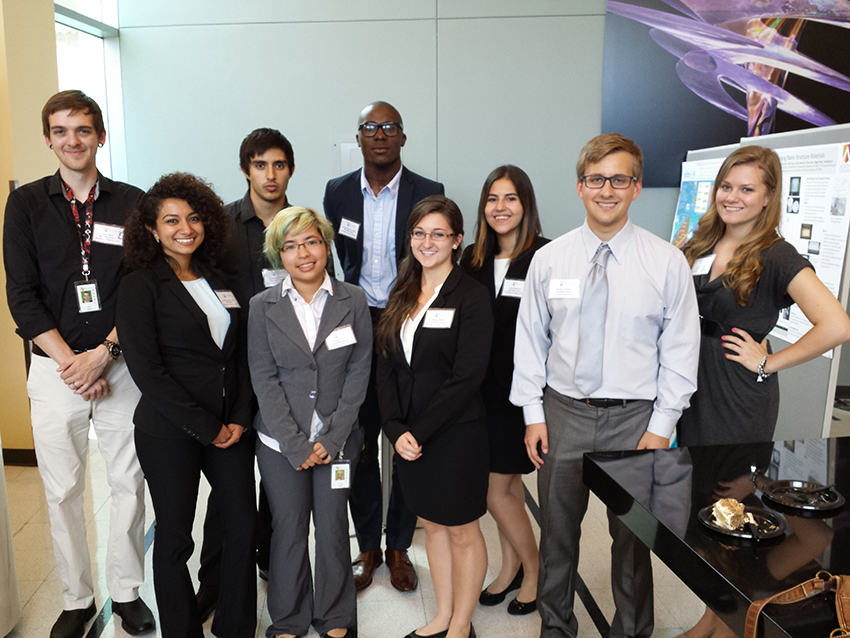
Students are working on software safety in Dr. Eric Wong's Research Experience for Undergraduates project. Participants often pursue advanced degrees and careers in science, technology, engineering and mathematics areas — which is a major goal of the program.
The Erik Jonsson School of Engineering and Computer Science at UT Dallas is home to two different research projects for undergraduate students sponsored by the National Science Foundation.
Dr. Eric Wong, professor of computer science, leads a Research Experience for Undergraduates (REU) project about software safety, and Dr. Amy Walker, associate professor of materials science and engineering, leads an REU project about surface engineering.
For each project, 10 undergraduate students spend the summer working individually and in teams on state-of-the-art research using state-of-the-practice techniques to help solve important questions critical to both academia and industry. The program provides about $500 a week to each student to cover transportation and other expenses. The students live in UT Dallas residence halls.
Software Safety REU
More than 60 students have participated in Wong’s REU. He has earned two awards from the NSF, the first in 2009 for three years for $280,000, the second in 2012 for nearly $560,000. Students in his program work on research concerning the safety of software used in industries such as transportation and health care.
“Software safety is an important topic but barely touched in undergraduate education,” Wong said.

Armand Halbert BS'13
Participants come from across the country, with a preference given to first-generation college students and students from small universities with limited resources to support undergraduate research. No more than 50 percent of the participants are UT Dallas students.
This past year, Wong provided leadership for all principal investigators in the computer and information science and engineering (CISE) REU. He organized the principal investigators meeting, helped prepare materials and led discussions to help the nearly 80 sites throughout the country be successful. He has also received funding from the National Science Foundation to oversee the design, implementation and maintenance of a website for all computer and information science and engineering REU participants.
“Leadership selection is based on a comprehensive evaluation,” said Wong, who is also director of international outreach for UT Dallas' Department of Computer Science. “Criteria include how many years you have run an REU, how much success you have had and how your students are doing after participation.”
Participants in Wong’s REU often pursue advanced degrees and careers in STEM (science, technology, engineering and mathematics) areas — which is a major goal of the program, he said.
Armand Halbert BS’13 participated in Wong’s REU program in 2012. It was Halbert’s first introduction to research.
“It was really interesting to be able to work on something that is completely unknown,” Halbert said.
After the summer, he continued to work with Wong on his REU research, finished his thesis and graduated with a bachelor’s degree in computer science with honors. He is currently a graduate student at the University of Massachusetts. He spent his summer conducting research at the National Institutes of Health (NIH).
“The reason I went to graduate school was because I expanded my REU experience into a bigger project,” he said. “My graduate work then led me to the NIH.”
Surface Engineering REU

Dr. Amy Walker
Walker, along with co-principal investigator Dr. Lev Gelb, associate professor of materials science and engineering, leads the REU on surface engineering. The program was first funded in 2012 for three years totaling $320,000.
The program is designed to give a broad-based view on surface engineering. Participants come from schools with limited research opportunities in states that are underrepresented in pursuit of PhDs, such as Arkansas, Louisiana, New Mexico, Oklahoma and Texas.
Walker and Gelb often collaborate with the Louis Stokes Alliances for Minority Participation, sponsored at UT Dallas by Dr. Juan Gonzalez, professor of biological sciences, and the McNair Scholars Program, whose participants are first-generation college students with financial needs or members of a group that is traditionally underrepresented in graduate education and have demonstrated strong academic potential.

The Research Experience for Undergraduates project led by Dr. Amy Walker is working on surface engineering.
Many students publish papers and choose graduate work after completing the surface engineering REU. Some have gone on to earn Barry M. Goldwater Scholarship and Excellence in Education, and Green Fellows program awards.
While encouraging graduate education is one goal, Walker said the program is designed to also give students realistic ideas about careers in science.
“We encourage them to pursue graduate-level work, but if that is not the case, they get really good training in what else they can do,” she said. “We want to make the program substantial and useful for the students.”
The students present posters of their summer research at the AVS Texas Chapter Conference, a meeting which can draw more than 80 groups from industry and academia from across the state.
Participation Information
Software Safety REU: The program will be from May 22 to July 30. The deadline to apply is March 15. read more
Surface Engineering REU: The program will be from June 1 to Aug. 7. The deadline to apply is Feb. 16. read more
“We want to show what the business of science looks like,” she said. “It’s important to the country that we create a pipeline of students pursuing careers in science, but we really want to help students decide what they want to do. If you want to get a PhD, that’s great. But on the other hand, you should know how and why this whole industry works.”
While UT Dallas undergraduate students can work in labs of materials science professors, the department only grants graduate degrees.
“In the least, an REU participant becomes one more person who knows about the great educational experience and research being conducted at UT Dallas,” Walker said.